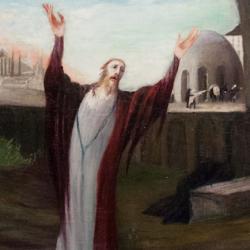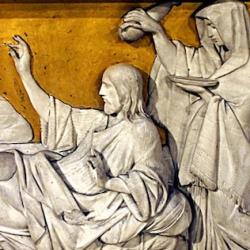The priests pay Judas 30 pieces of silver to betray Jesus (Matthew 26:15). The amount of the payment takes us back to Exodus 21:32 and Zechariah 11:12-13. Here I want to muse on the connection between Matthew and the Exodus passage.
The scenario in Exodus is this: A man owns a dangerous ox who has gored people in the past. If the animal gores and kills a free man or woman, the owner has to be put to death and the animal stoned. Ransom may be demanded as an alternative, since the owner of the goring ox is not exactly guilty of murder (v. 30). If the ox gores and kills a slave, however, the owner is responsible only to pay restitution to the owner, thirty shekels of silver, and the ox is stoned (v. 32).
How does this fit in with Matthew 26? It’s hard to see how the situation fits exactly, but the reference to thirty pieces evokes the law of Exodus 21, and sets up a particular angle for viewing the betrayal and Passion.
As James Jordan has noted, animals are created to be submissive to human beings, and animals that rebel are like the serpent. The ox is an incorrigible rebel against human authority, a demonized beast. To this, we might add that bovines are particularly associated with the Mosaic period of Israel’s history and with the priesthood. An incorrigible ox is an incorrigible priesthood, a rebellious priestly people. Psalm 22 fits here, describing the attack of bulls and lions against David. That is a Messianic prophecy, and it shows that the Messiah will be oppressed by an alliance of priestly/Israelite goring oxen and kingly/Gentile lions (vv. 11-12, 20-21).
On the other hand, Jesus comes in the form of a servant. He is the gored slave, valued at 30 pieces of silver. Hung on a tree, He is “gored” on the cross, pierced in hands and feet.
The priests are thus the goring oxen, in the habit of goring: As Jesus said, they are the people who kill the prophets and shed the blood of all those who have been sent to them. They have not yet gored Jesus, but they are preparing to gore him, and pay a kind of “pre-emptive ransom” to cover themselves (note the link with the “atonement money” in Exodus 31, and the structural analysis of Matthew 26 that I posted earlier this week). It doesn’t cover them; the money is returned. The slave’s owner does not accept a ransom. In any case, the goring ox has to be put to death. Israel is doomed.
That all seems to work, but there is an interesting redemptive twist on this. The priests pay for the dead slave before the slave dies; they are the goring ox that should be stoned. But the priests don’t die; the slave does, and when the slave comes back to life the ox is given a reprieve. The ox of Israel, though, will keep goring, and eventually will run out of chances for ransom. Then the ox will be stoned; then not one stone will be left on another, but only a pile of rubble over the corpse of the ox of Israel.











